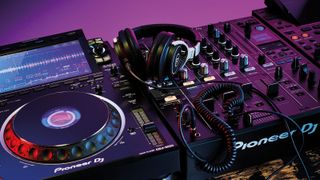Aside from your music, headphones are the single most important DJ tool. You’ll use them for every gig, and they really are key to your performance: at the most basic level, if you’re DJing, you’ll need to be able to hear your tracks and cue them up before playing them on the main system, and you’ll need to be able to monitor your transitions - and you can’t do this without a pair of the best DJ headphones.
And this is true whether you’re playing off your phone, beat matching with vinyl, rocking your controller and laptop set up or triggering loops in Ableton Live. Sure, you might see a few big DJs on your timeline who seem to be playing festival main stages without headphones, but to be honest, most of them don't need headphones because they’re playing pre-programmed sets where the breaks and drops are timed to coincide with the pyrotechnics and glitter cannons. For the rest of us, headphones are absolutely essential.
As with all DJ gear, there is a plethora of options out there, in terms of budget, style, durability, quality and specification. In choosing which are the right headphones for you, you’ll need to consider what you’ll be using them for, and what exactly you’ll need. Are you going to be practising at home, streaming your set online, or playing gigs in the club or at festivals? Are durability and reliability the most important things to you, or is it sound quality, or budget, or looks? Or a combination of all these factors?
In this guide, our experts have highlighted some of the best DJ headphones available in 2024, from top-end models to more affordable options, so you can find the perfect pair suited to your level and requirements.
If you’re not sure what you need from your headphones, we’ve added some useful buying advice at the bottom of the page. And if you want to get a quick overview of our top choices, scroll down for a quick view of our favourites.
Looking for a headphones bargain? Explore hand-picked savings on gear we rate and stay updated with this year's best Prime Day music deals.
Quick list
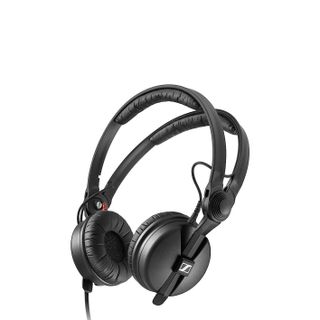
The Sennheiser HD 25 is as close as you’ll find to a universally well-loved set of cans. They are designed specifically for monitoring, providing high levels of attenuation over external noise and the ability to cope with extreme volumes with ease.
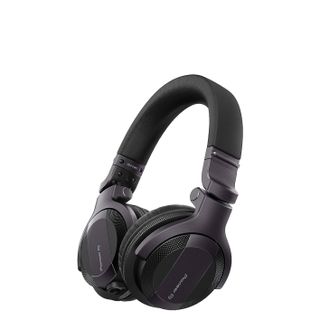
Pioneer DJ’s budget headphones take many of the winning design choices from the brand’s more expensive HDJs and bring them down to a price point to suit beginners and cash-strapped DJs. They’re very impressive for a set of entry level DJ headphones.
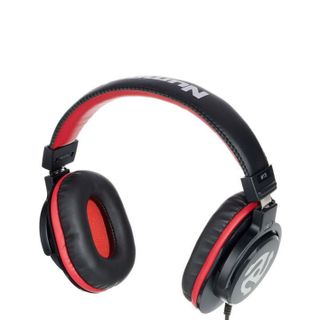
Numark’s cheap-as-chips HF125 headphones have been a classic choice for beginner DJs for decades now, and the recently-released HF175s act as an update of sorts. These cans are a step in the range, boasting improved sound and a more comfortable on-ear design, albeit at a price point that still makes them thoroughly affordable for complete newbies.
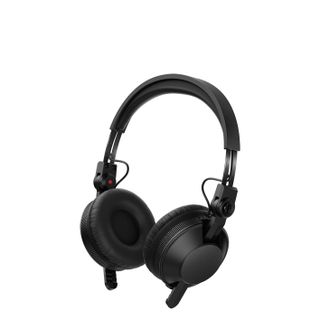
The HDJ-CXs are designed to be lightweight but robust, making them ideal for DJs regularly shifting them on and off the ear. They also feature easily replaceable cables and accessories, which should extend their lifespan, especially for regularly gigging DJs.
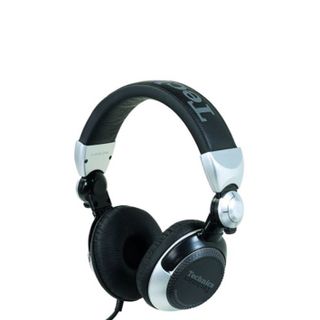
The Technics RPDJ1210 favour robust design and strong build quality over fancy aesthetic touches. And it’s in the trenches where they excel, with a number of features designed specifically for professional DJ use, as you’d expect from one of the biggest brands in the DJ world.
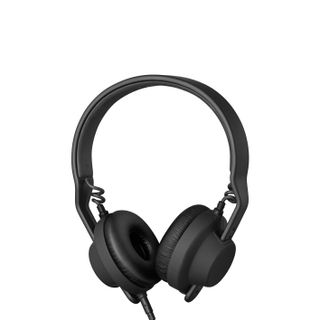
The real hook with this range comes in your ability to design your own dream setup. From the types of drivers employed to the headband and cable – everything is up for customising here, depending on your requirements. There are, however, a selection of models available as ‘presets’ if you’re not interested in the process of choosing your own.
Load the next 4 products... ↓
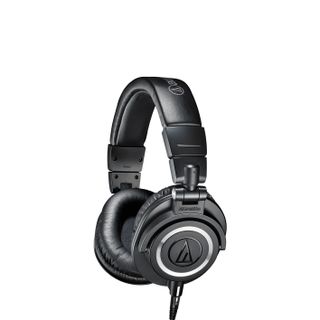
Audio-Technica is well-respected in the DJ world, and the ATH-M50x’s do a great job of showing why. They’re well-built headphones, for a start, which look like they could survive years of service before they give out. We also liked the over-ear design which, when combined with the closed back, means isolation from external noise is great.
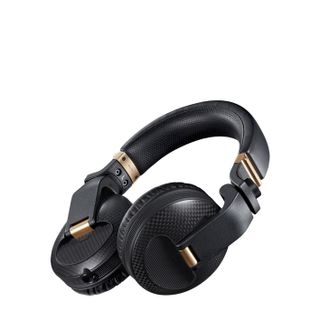
The Pioneer DJ HDJ-X10 are over-ear closed back headphones with what Pioneer claims is the widest frequency range in any DJ-specific headphones. Quite a claim, but we can attest to the great listening experience we had from them. The highs were high, the lows were low, and everything was a balanced and clear as you’d hope.
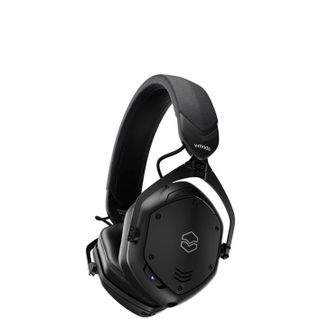
The Crossfade headphones provide a ‘best of both worlds’ approach to headphone monitoring. On one hand, the Crossfades can be wired to provide zero latency feedback, and a wide frequency range, meaning they have the reliability needed for tight beat mixing or music production. On the other hand, they boast Bluetooth so can double up as ‘regular’ headphones for the walk to and from the studio. Ideal.
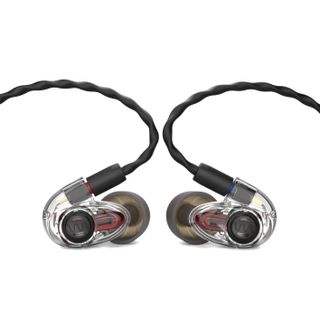
The Westone Audio AM Pro X 10 in-ear monitors warrant inclusion on this list thanks to their passive ambience functionality. Essentially, thanks to some clever filtering, the AM Pro X 10s do let in some noise, so you get the best of both worlds. A clear feed of what you’re playing, and then an idea of how the crowd is hearing it too.
Best overall
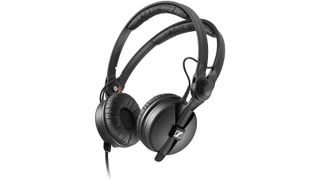
While everyone will have their own personal preferences and tastes, the Sennheiser HD 25 is as close as you’ll find to a universally well-loved set of cans. The HD 25s are designed specifically for monitoring, providing high levels of attenuation over external noise and the ability to cope with extreme volumes with ease.
They feature a rotatable capsule for single-ear listening, and while the leatherette pads aren’t the most comfortable in the world, they certainly perform better than others in the same price bracket.
Read the full Sennheiser HD 25 review
Best budget option
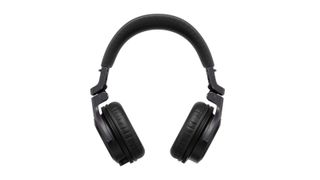
Pioneer DJ’s budget headphones take many of the winning design choices from the brand’s more expensive HDJs – feature elsewhere in this guide – and bring them down to a price point to suit beginners and cash-strapped DJs.
While the sonic specs, such as impedance and frequency response, don’t quite match Pioneer’s top-end cans, they’re still very impressive for a set of entry level DJ headphones. Sonically, these outstip many of the more expensive pairs on the market.
The thing we like most about the Cue1s though is their styling. Many budget sets of DJ headphones tend to look cheap and toy-like – HF125s we’re looking at you – but the Cue1s have a stylish and pro-feeling design, which can be customised by purchasing replacement coloured ear pads and cables. The sharp look is matched by some DJ-friendly design touches, such as the lightweight, foldable body and detachable cables.
If you want to go fully wireless, Pioneer also produces a Cue1 BT model offering Bluetooth functionality for around £30/$30 more.
Best for beginners
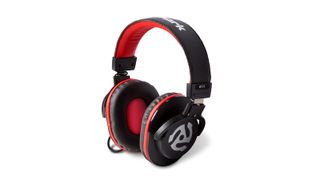
Numark’s cheap-as-chips HF125 headphones have been a classic choice for beginner DJs for decades now, and the recently-released HF175s act as an update of sorts. These cans are a step in the range, boasting improved sound and a more comfortable on-ear design, albeit at a price point that still makes them thoroughly affordable for complete newbies.
With a frequency range of 15Hz-22kHz, you can expect more bass response here than with the HF125s. The response is far from what we’d call natural or balanced - over-egging the low/low-mids somewhat - meaning that, while the HF175s are plenty good enough for DJing, they’re not up to studio monitoring duties. That would be asking a lot for entry-level headphones like these though.
At this price, our only real criticism is the design; the red-and-black styling looks a little naff to our eyes, but this is entirely subjective. That aside, for a super-cheap set of DJ cans, these are hard to knock.
Best lightweight option
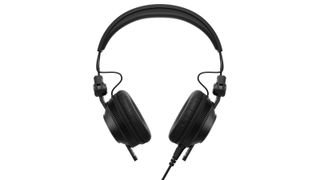
Given their look, it doesn’t take an expert to work out that the HDJ-CXs (£120) are Pioneer’s answer to Sennheiser’s industry-leading HD25s. Much like that widely-used set of DJ cans, the HDJ-CXs are designed to be lightweight but robust, making them ideal for DJs regularly shifting them on and off the ear.
They also feature easily replaceable cables and accessories, which should extend their lifespan, especially for regularly gigging DJs. That said, they’re not quite as ‘rebuildable’ as the HD25s.
Where Pioneer believes its cans have the edge over the competition is in the sound, as well as the level of comfort over long periods of use. Whether that’s enough to topple the champs in this sector remains to be seen!
Best for durability
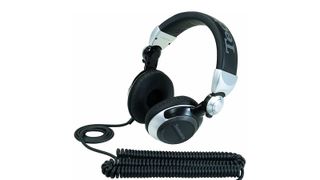
While they might look like something from the last century, the Technics RPDJ1210 favour robust design and strong build quality over fancy aesthetic touches. And it’s in the trenches where they excel, with a number of features designed specifically for professional DJ use, as you’d expect from one of the biggest brands in the DJ world.
We like the coiled cable, which means you have more room to roam around the booth, while making them resistant to perspiration – or, sweat proof – means they’re ideal for work in hot, busy venues.
Best for customisation
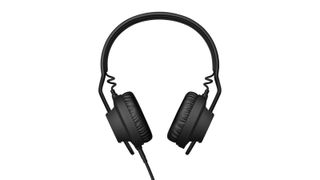
Danish brand AIAIAI delivers a bit of Scandi design flair with its TMA-2 range. The real hook with this range comes in your ability to design your own dream setup. From the types of drivers employed to the headband and cable – everything is up for customising here, depending on your requirements.
There are, however, a selection of models available as ‘presets’ if you’re not interested in the process of choosing your own. One such design is this DJ-centric setup, which is spec’d for powerful, bass-heavy sound and includes a robust, reinforced headband.
Higher up the price range, AIAIAI has also recently released the new TMA-2 Studio Wireless+ headphones, which are created in collaboration with Richie Hawtin. These boast ‘ultra-low latency lossless’ Bluetooth audio, although come in at nearly twice the price of the standard DJ configuration – and we’re not convinced it’s worth shelling out on wireless functionality in the DJ booth.
Best for live use
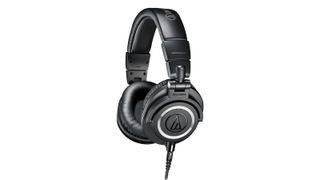
Audio-Technica is well-respected in the DJ world, and the ATH-M50x’s do a great job of showing why. They’re well-built headphones, for a start, which look like they could survive years of service before they give out. We also liked the over-ear design which, when combined with the closed back, means isolation from external noise is great.
There are a couple of DJ-specific tricks too, like swivelling earcups and interchangeable cables, making for a solid mid-range choice all round.
Read the full Audio Technica ATH-MX50 review
Best for balance
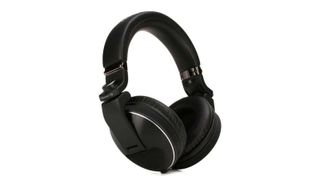
Another big brand in the DJ world, Pioneer has as much heritage as anyone so you’d assume its upper-mid range headphones would be good. You’d be right too! The Pioneer DJ HDJ-X10 are over-ear closed back headphones with what Pioneer claims is the widest frequency range in any DJ-specific headphones. Quite a claim, but we can attest to the great listening experience we had from them. The highs were high, the lows were low, and everything was a balanced and clear as you’d hope.
Pioneer also says the HDJ-X10 were subjected to ‘military grade’ testing while they were being developed, so you’d imagine they’d stand up to small to medium sized venue use pretty well.
Best all-rounder
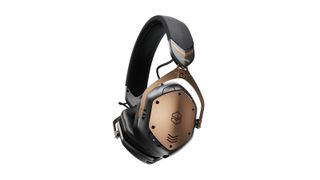
The Crossfade headphones, from Milan-based brand V-Moda, provide a ‘best of both worlds’ approach to headphone monitoring. On one hand, the Crossfades can be wired to provide zero latency feedback, and a wide frequency range, meaning they have the reliability needed for tight beat mixing or music production. On the other hand, they boast Bluetooth so can double up as ‘regular’ headphones for the walk to and from the studio. Ideal.
The Crossfade range has recently hit its third iteration. Changes include a variety of new colour options and a slightly punchier sound. The headline feature of Crossfade 3, however, is the improved wireless battery life, quoted as up-to 30 hours from a single charge.
There are specialist headphones on this list which, for a similar price, offer a purer DJ experience, and - as stated in our buying advice below - we’d question how useful Bluetooth connectivity is for purely DJ purposes. However, for the price, Crossfade 3s give you a stylish and high-quality set of cans that can handle duties both in and out of the booth.
Best in-ears
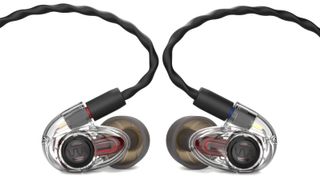
Typically, in-ear monitors (IEMs) excel at completely blocking you off from the outside world. They are traditionally used by musicians, so they can hear what their fellow performers are playing and ensure they stay in time, tune and sync with each other. And, while the Westone Audio AM Pro X 10 IEMs perform this task admirably, they also warrant inclusion on the list thanks to their passive ambience functionality. Essentially, thanks to some clever filtering, the AM Pro X 10s do let in some noise, so you get the best of both worlds. A clear feed of what you’re playing, and then an idea of how the crowd is hearing it too.
We loved the included carry case, and the different ear-tips, which meant we could find the perfect fit for our ears. The cable is fairly short, so you might need to factor in an extension, but otherwise, there’s a lot to like here - especially if you’re yearning for an end to spending your evenings with bulky over-ear cans on.
Read the full Westone AM Pro X review
Buying advice
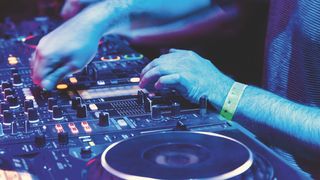
How to choose the best DJ headphones for you
MusicRadar's got your back
Once you’ve decided on your budget, the factors to consider are going to be different from studio or home listening headphones. For example, the most important quality in studio headphones is the ability to reproduce the sound as accurately as possible to aid mixing and mastering. In contrast, many headphones for music listening will flatter the sound, boosting the bass or applying a ‘loudness’ EQ to increase impact.
When it comes to DJing, obviously headphone sound quality is important, but it may not be the most important factor. When you’re DJing, you’re not listening to the nuances in the music in order to make minor EQ adjustments, and you’re not lying back and enjoying that gorgeous fat bass sound on a new track: your primary requirement is to be able to hear clearly above the noise of club-sized sound systems and the crowd. So when it comes to DJing, how authentic or ‘amazing’ the signal coming through your headphones sounds isn’t so much of an issue. What’s vital is the ability to pick out the kicks, snares, hats and claps so you can accurately monitor and mix.
Considering design and durability
Another major consideration for DJ headphones is comfort. You’re going to be wearing your headphones for hours on end, in hot, sweaty conditions, so getting a pair that fit well and are comfortable is vital.
Durability and toughness are super important too because out of all your DJ kit, your headphones are probably going to get the most use. Your new cans are going to travel, get pulled in and out of bags, you’re going to be adjusting them all night, taking them off and on your ears, so they need to be hardwearing. Buying a cheap pair is almost always going to be a false economy: nobody who invested in a decent set of headphones ever regrets it in the long term.
Do I need wired or wireless DJ headphones?
Home listening headphones in general are increasingly going wireless and incorporating Bluetooth technology over traditional wired connections. But is this an asset in a set of headphones for DJing? We’d argue that on the whole, it’s best to avoid wireless headphones for DJ mixing. While latency is becoming less of an issue with modern Bluetooth technology, it does still exist, and any latency is going to make beatmatching super-difficult. There are also the issues of connections dropping out or devices running out of charge mid-set.
There currently isn’t really a DJ need that Bluetooth headphones are addressing, unless you’re in the 1% of performing festival DJs who run around the stage during their set. If that’s you, then maybe Bluetooth headphones are the right choice, but otherwise, until the technology becomes as dependable as wired, it’s not really worth the extra cost and potentially scuppering your set to go cable-free.
How we test DJ headphones
Our guide to the best headphones for DJs is based on the experiences of our team of writers and reviewers. What we look for in a set of headphones for DJ use isn’t exactly the same as the way we’d test a set of headphones for studio or home use. Of course, it comes down to sound quality in part; we’ll use each set of headphones to play tracks we know well so we can hear the nuances and differences. In the case of DJ headphones we’ll focus particularly on electronic, pop and dance music.
As much as the sound though, the criteria for testing a set of DJ headphones comes down to how they feel in use. A good pair of cans for mixing need to feel comfortable but reliable. How heavy are they when worn around the neck for long periods? How easy is it to get them on and off your ears when beatmatching? Do they feel sturdy enough to stand up to regular gigging and if anything breaks, how easy are parts to replace?
Find out more about how we test music gear and services at MusicRadar.
Related buyer's guides
- More DJ gear: these are the best DJ mixers available today
- The best DJ controllers from Serato, Traktor, rekordbox and more
- And check out the best DJ turntables
- Upgrade your rig with the best DJ speakers
- Best DJ laptops: PC and Mac options for the booth and beyond
- Our pick of the best gifts for DJs
